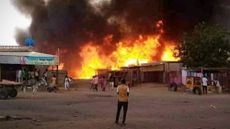Why analysts say the Lebanese government's mass resignation may not change much


While the resignation of Lebanon's Prime Minister Hassan Diab and his Cabinet amid protests following a blast in Beirut that killed at least 160 people last week may seem monumental, analysts are skeptical it will have a lasting effect on a country where people have been calling for fundamental change since long before the explosion.
For starters, not everyone considers the resignations as all-encompassing as the appear, since numerous high-ranking authorities including President Michel Auon remain in power.
And just because the politicians who did resign are out of the picture for now, that doesn't mean they will be for long.
Subscribe to The Week
Escape your echo chamber. Get the facts behind the news, plus analysis from multiple perspectives.

Sign up for The Week's Free Newsletters
From our morning news briefing to a weekly Good News Newsletter, get the best of The Week delivered directly to your inbox.
From our morning news briefing to a weekly Good News Newsletter, get the best of The Week delivered directly to your inbox.
Ultimately, analysts say, the change desired by protesters is systemic, and not simply tied to the current government. Indeed, three prime ministers and two presidents have been in power since the explosives that caused the blast were stored in a Beirut port warehouse and neglected for seven years. Tim O'Donnell
Create an account with the same email registered to your subscription to unlock access.
Sign up for Today's Best Articles in your inbox
A free daily email with the biggest news stories of the day – and the best features from TheWeek.com
Tim is a staff writer at The Week and has contributed to Bedford and Bowery and The New York Transatlantic. He is a graduate of Occidental College and NYU's journalism school. Tim enjoys writing about baseball, Europe, and extinct megafauna. He lives in New York City.
-
 Magazine interactive crossword - May 3, 2024
Magazine interactive crossword - May 3, 2024Puzzles and Quizzes Issue - May 3, 2024
By The Week US Published
-
 Magazine solutions - May 3, 2024
Magazine solutions - May 3, 2024Puzzles and Quizzes Issue - May 3, 2024
By The Week US Published
-
 Magazine printables - May 3, 2024
Magazine printables - May 3, 2024Puzzles and Quizzes Issue - May 3, 2024
By The Week US Published
-
 Ukraine cheers House approval of military aid
Ukraine cheers House approval of military aidSpeed Read Following a lengthy struggle, the House has approved $95 billion in aid for Ukraine and Israel
By Peter Weber, The Week US Published
-
 Poland, Germany nab alleged anti-Ukraine spies
Poland, Germany nab alleged anti-Ukraine spiesSpeed Read A man was arrested over a supposed Russian plot to kill Ukrainian President Zelenskyy
By Peter Weber, The Week US Published
-
 Israel hits Iran with retaliatory airstrike
Israel hits Iran with retaliatory airstrikeSpeed Read The attack comes after Iran's drone and missile barrage last weekend
By Peter Weber, The Week US Published
-
 Peter Murrell: Sturgeon's husband charged over SNP 'embezzlement' claims
Peter Murrell: Sturgeon's husband charged over SNP 'embezzlement' claimsSpeed Read SNP expresses 'shock' as former chief executive rearrested in long-running investigation into claims of mishandled campaign funds
By Arion McNicoll, The Week UK Published
-
 Mark Menzies: Tories investigate MP after 'bad people' cash claims
Mark Menzies: Tories investigate MP after 'bad people' cash claimsSpeed Read Fylde MP will sit as an independent while party looks into allegations he misused campaign funds on medical expenses and blackmail pay-out
By Arion McNicoll, The Week UK Published
-
 Why Johnson won't just pass Ukraine aid
Why Johnson won't just pass Ukraine aidSpeed Read The House Speaker could have sent $60 billion in military aid to Ukraine — but it would have split his caucus
By Peter Weber, The Week US Published
-
 Sudan on brink of collapse after a year of war
Sudan on brink of collapse after a year of warSpeed Read 18 million people face famine as the country continues its bloody downward spiral
By Peter Weber, The Week US Published
-
 Trump's first criminal trial starts with jury picks
Trump's first criminal trial starts with jury picksSpeed Read The former president faces charges related to hush money payments made to adult film star Stormy Daniels
By Peter Weber, The Week US Published